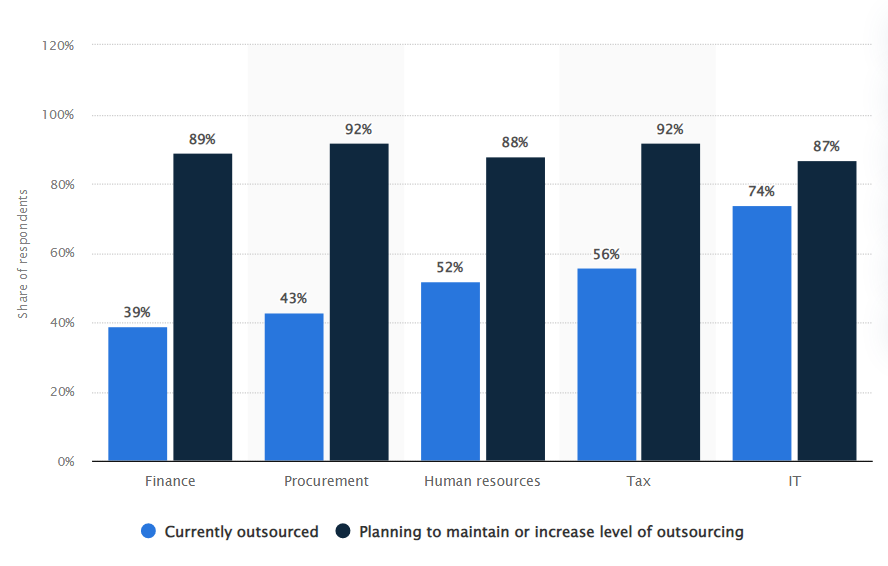Mobile applications are easing our day-to-day lives making the request for app development increase. When it comes to developing a mobile application, the main challenge besides funding and delivery time is to have a highly-skilled app development team to work on the project.
In today’s business world, there are lots of demands and challenges, including those that were mentioned earlier. Before starting a mobile project, a business owner might want to measure and assess his present resources in relation to his business demands.

Considerations should be made to ensure the availability of the best-related skill sets and a reasonable number of developers with the required training and work experience. The absence of the aforementioned rises the question. What will be the implication for covering this absence?
The way out can be a quest for businesses. At the same time it is the reason why a variety of companies are leaning towards outsourcing their mobile app development projects.
Advantages of Outsourcing App Development
A worldwide statistic report reveals the outsourcing strategies for the various business functions. During the survey, over 70 percent of respondents stated that they currently outsource their IT services and a further 87 percent plan to maintain or increase their use of IT outsourcing in the future.

Source: Statista.com
Judging by statistics, most companies are taking refuge in outsourcing, and the numbers are on the rise. So what are the reasons companies prefer it as an option?
Well, while outsourcing app development entails a lot of benefits, each business turns to it following its specific goals. However, we can outline the most common reasons why so many companies choose to delegate their project delivery to a third party. So here they are:
- Cost savings
- Project risk reduction
- Access to an experienced team
- On-time delivery
- Support and maintenance
- Ensured outcomes
Like any other option to build a mobile app, outsourcing the development also has some considerations. To provide you with more information on the topic and help you decide whether outsourcing is the right choice for you, let’s compare the key alternatives side by side.
Pros |
Cons |
|
|---|---|---|
Outsourcing to a mobile app development company |
|
|
In-house app development |
|
|
Hiring freelance developers |
|
|
Read about the Best Practices to Outsource Your Software Development
Choosing a Winning App Development Strategy
Watch our webinar to uncover effective mobile development approaches and launch your app.
Indicating Signs You Should Outsource Mobile App Development

1. Absence of Mobile App Development in Your Main Business Functions
If your existing business functions and services have little or nothing to do with mobile app development, then it means you lack the required knowledge base.
The process of mobile app development entails in-depth, recent knowledge of several technologies and many related tools. Your business, like many others, might have an in-house team that can work on tasks other than creating apps. Unfortunately, this is not helpful, and you will need a lot of capital investment in a team of mobile developers with good skills and experience.
It’s better for you to outsource the project. The risk of failure will be minimal as you will be engaging the services of a software vendor that is in the required business of mobile app development.
Lack of Developers
Find out how to deal with the lack of IT talents without compromising project delivery.
2. Lacking the Required Expertise and Skills
This point is similar to the one mentioned above. In this case, there is actually a functional in-house mobile development team, but the skill set required for the project is different. It will be risky to rely on unproven skills or talent for some types of mobile applications.
You might be stranded halfway or simply fail if you have, for example, a project that needs cloud integration or blockchain and your team members lack such skills. In this situation, you have the cost to adopt a new team of mobile developers, but you simply don’t have the luxury of time or patience. This can be due to the fact that the training sessions will take a lot of time, and result in a setback, affecting the target time for product release.
Outsourcing can be a great alternative to the creation of a new team with the required skills. You don’t need to train the existing employees, which will take more time and resources.
3. You Need Tools and Licenses for the App Development Project
You need to set up the infrastructure for your mobile project. And the requirements can significantly vary depending on the app. The development of mobile applications calls for lots of technological tools and devices. This is a bridge you must cross.
There is a need for acquiring licenses and renewing them upon expiry. This is even more important when technology evolves, including the tools for mobile development which can be frequently replaced.
App Quality Assurance is attainable by the volume of test cases and the variety of devices used for such. Thus, mobile development requires access to a multiplicity of real devices, operating system versions, tools, and services that may result in additional cost.
All these challenges can easily be avoided by outsourcing. This is because the company you outsource to will be responsible for all the tools and licenses, leaving you in the clear to focus on other business demands.
4. The In-House Team is Overloaded
If you have a competent in-house team with the required skill set and experience desired for the mobile app, it can happen that they have their hands full and you have no space to take on new projects.
In this situation, it is best to outsource your app development. Too much workload will reduce the efficiency of your in-house team besides the fact that delivery time will surely be affected.
Expanding a Team
Watch our webinar to unveil the tricks of onboarding a tech partner and incorporating it into the process to foster your product delivery.
5. Limited Project Timeline
Let’s consider a case when your in-house mobile development team will race against time to complete your project for some reason and they might not be able to deliver it on time. If you realize that scaling up your team will be a solution, then you need to get the help of an IT vendor. You have no time for experimenting with new hires or using trial-by-error methods. You must be sure where you are heading.
Another scenario is if you don’t have an in-house team and you want to put up one, but the project release date is fast approaching. Hiring a new team can be time-consuming, and you might not meet up with the anticipated delivery time.
By outsourcing you will naturally avoid time-wasting activities like recruiting and training new developers. Eventually, you can thoroughly build your team while the software development vendor is working on your urgent project.
6. You Are a New Startup or You Have a Limited Budget
Outsourcing app development, especially among small companies, is becoming a regular practice. Most of them do not have specialists to work on their projects, and even if they do — the expenses on salaries and taxes are challenging. Negotiations with your approved development partner will cater for a project timeline and an agreed mobile app cost under your control.
If you are running a startup business, outsourcing is of great advantage to the formation of your own development team. The big plus is that you will enjoy the time to grow, have fewer expenses, and acquire project experience. The outsourcing team will definitely carry you along the development process as the project goes on.
7. No Internal Resources to Manage the Project
Depending on the scenario of the project, there are specific methodologies, tools, and approaches used in a mobile application development cycle. From our experience, a competent project manager with relevant hands-on development background is a secret ingredient of a successful project.
If you have no internal resources with relevant experience or all your PMs are overloaded with other initiatives, it is already a good reason to outsource mobile app development. The lack of resources and mismanagement can make a project fail.
8. You Can’t Commit Long-Term Resources on App Support
In order to stay competitive and relevant, all applications continually need to be maintained and updated. After the successful launch, the development team can always include additional touches here and there or deliver new features.
If there is no room for this to be done in-house, then it can be a justification for outsourcing a mobile app project. The team you outsource to will be responsible for the process of updating, upgrading, and any other challenges involved.
9. You Don’t Want to Bear the Production Risk
There are no mobile development projects with no risks involved. All the risks and work pressure are transferred to the company you outsource your app to. Due to the fact that there is a binding contract, your partners will take upon them all the project’s responsibilities and factors of production, including the risks.
Be sure your choice of vendor is based on a deep understanding of the project and all the possible risks. Such a vendor must have the initiative to act. This will cover you until the product release, provided you fulfill all your legal obligations.
Your Next Move
After considering all the aforementioned – the ever-changing environment of app development, and the desire for a quality mobile application at an effective cost – it is very pragmatic to outsource your projects to capable hands to save a lot of stress.
Engage your outsourcing with a competent IT company and relate with them as valuable and trusted partners. This will assist you to reach all your business goals, overcome bottlenecks, and save you some valuable resources.
A well-skilled and experienced mobile development team can successfully facilitate your app production process from scratch and bring it to a significant product release. Velvetech team is willing to see you through this process. Check out our mobile development services and contact us today for a consultation.

































